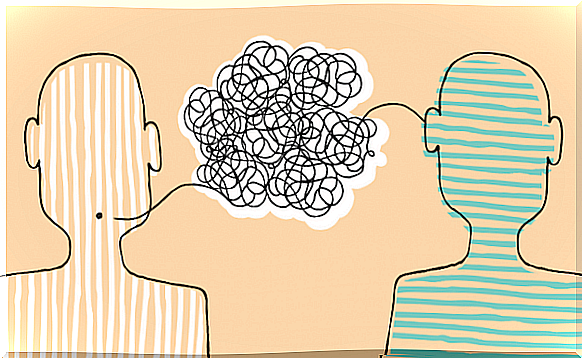8 Keys To Effective Communication

We are social beings by nature. Relationships with others have emotional benefits for us, such as understanding, support, and improved self-esteem. Even so, many people cannot connect with their fellow human beings. This can be due to several causes, such as the inability to communicate effectively.
In contrast, those people who have no problem establishing effective communication are the ones who know how to develop their social intelligence. Some authors, such as the American psychologist Daniel Goleman, speak in their lectures about the importance of this talent. It is the ability to maintain harmonious and peaceful relationships with others, without sacrificing assertiveness.
Skills like empathy and understanding are essential if a social connection is to be created. However , making another person feel confident, safe, and understood about us is often not an easy task.
Fortunately, there are a number of tools that can be used to improve this emotional intelligence. The steps to achieve effective communication can be learned and taken if we strive to do so. Furthermore, we can understand the world of social relationships a little better by reading about it and applying what we have learned.
Key to effective communication
In any type of interaction, we need to consider non-verbal communication. Non-verbal communication is often disregarded, although in many cases it is more important than the content of the message itself. Gestures, facial expressions, and posture are largely responsible for ensuring that the person we are talking to creates an image of us.

Synchronicity also plays an important role in the communication process. Daniel Goleman explains that this ability makes it possible to read non-verbal cues, from smiling to nodding at the right time. People who cannot be in sync create a feeling of discomfort and alienation in others. This behavior is known as “dysemic” and is characterized by the fact that the signals that end a conversation or change its course are not understood.
These social deficits are not neurological in nature, but the result of a faulty learning process. There are currently a number of programs in place to instill synchronicity between children and adults. For people who have this type of problem, learning to communicate effectively in these programs doesn’t have to be difficult because we can all improve our social skills and get the message that really interests us by following a set of guidelines .
” Empathy is the ability to think into and feel about another person’s life.”
Heinz Kohut
1. Paraphrase
Questions and paraphrases are important elements of effective communication. Contrary to what it might seem, they show not reluctance, but interest. The other person feels listened to, which creates a climate of empathy and understanding.
Paraphrasing, in turn, allows us to clear up parts of the conversation that we don’t understand well, while at the same time showing that we are listening. Of course, this is a resource like any other that we must use at the right moments. If we use it at the wrong moments, it can block communication and the other person might think that we are mocking them.
2. Give compliments
Flattery reinforces what the other is saying. It is very useful to use expressions that convey agreement: “I think what you are saying is perfectly correct”, “I agree with you” or “I love to philosophize with you” . Less direct expressions such as “Fantastic!” Can also be used. or “Exactly!” be used.
3. Show empathy
Empathy is a quality that not everyone has. Being able to put yourself in the other person’s shoes improves communication significantly. It creates a positive relationship, a sympathy, a climate of understanding and trust. It is also overwhelming that we can be close and attentive. It increases coordination between speakers, which in turn enables effective communication.

4. Pay attention to the context
Good communicative style can be ruined if we don’t take context into account. The environment, the people involved in the conversation, and the topic we are discussing are all important. We should avoid arguing or admonishing anyone in front of other people. In society, we should rather focus on the positive.
The noise, the place and the moment should be as comfortable as possible. If we find that this is hindering our conversation, it is better to postpone it.
5. Respect each other’s opinion
Respecting the opinion of others is essential. Insulting, discrediting, and underestimating another person’s beliefs indicate a lack of maturity. Throughout our lives, we will meet many people who think differently than we do. We can discuss with them and debate, but must also, in many cases accept, that there may be several valid points of view on a matter.
After listening to their ideas and arguments, we can still think the same thing, but it also makes sense to question some of our (pre-) judgments. Openness not only benefits our interpersonal communication, but also our own knowledge.
6. Keep eye contact
We recommend making eye contact with the other person because it improves the connection between us. It has to be done naturally, as the look is a very expressive element.
The opposite situation occurs when we cannot bear the other person’s gaze because it conveys insecurity. If we look the other way while speaking, it implies a lack of interest in the other person. A look down may suggest that we are.
“Effective communication is 20% what you know and 80% how you feel about what you know.”
Jim Rohn
7. Pay attention to the personal sphere
When trying to strengthen the connection with the other person or to emphasize our position, we can inadvertently invade the other person’s personal space. Getting too close to someone, contrary to what we sometimes think, rarely brings closeness. Many people then feel uncomfortable and want to leave.
We should look at two factors in the distance we maintain: the level of trust we have in the other person and the nature of the subject. We shouldn’t be too far or too close because we’re not trying to arouse suspicion or suspicion, are we ?

8. Mutual respect
Disregarding one another and being rude disrupts effective communication between the parties. It is necessary to wait for the other to finish speaking. In oral communication , everyone involved has to let each other finish speaking.
The steps to achieve effective communication are generally pretty straightforward. They may feel a bit forced at first, but as we practice them we will begin to notice their positive effects. After all, communication is a natural process and improving related skills helps us face the world with courage.









